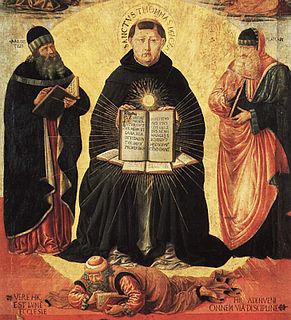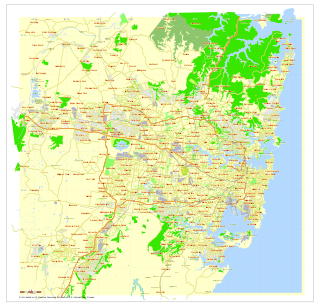
Original sin, also called ancestral sin, is a Christian belief in the state of sin in which humanity has existed since the fall of man, stemming from Adam and Eve's rebellion in Eden, namely the sin of disobedience in consuming the forbidden fruit from the tree of the knowledge of good and evil. This condition has been characterized in many ways, ranging from something as insignificant as a slight deficiency, or a tendency toward sin yet without collective guilt, referred to as a "sin nature", to something as drastic as total depravity or automatic guilt of all humans through collective guilt.

Concupiscence is an ardent, usually sensual, longing. Involuntary sexual arousal is explored in the Confessions of Augustine, wherein he used the term "concupiscence" to refer to sinful lust. In Catholic theology, concupiscence is seen as a desire of the lower appetite contrary to reason.

The fall of man, or the fall, is a term used in Christianity to describe the transition of the first man and woman from a state of innocent obedience to God to a state of guilty disobedience. Although not named in the Bible, the doctrine of the fall comes from a biblical interpretation of Genesis chapter 3. At first, Adam and Eve lived with God in the Garden of Eden, but the serpent tempted them into eating the fruit from the tree of knowledge of good and evil, which God had forbidden. After doing so, they became ashamed of their nakedness and God expelled them from the Garden to prevent them from eating from the tree of life and becoming immortal.
Hamartiology, a branch of Christian theology, is the study of sin.

The Orthodox Church presents a view of sin distinct from views found in Roman Catholicism and in Protestantism, that sin is viewed primarily as a terminal spiritual sickness, rather than a state of guilt, a self-perpetuating illness which distorts the whole human being and energies, corrupts the Image of God inherent in those who bear the human nature, diminishes the divine likeness within them, disorients their understanding of the world as it truly is, and distracts a person from fulfilling his natural potential to become deified in communion with God.
A vocation is an occupation to which a person is specially drawn or for which they are suited, trained, or qualified. Though now often used in non-religious contexts, the meanings of the term originated in Christianity.
In Christianity, the gospel, or the Good News, is the news of the coming of the Kingdom of God. The message of good news is described as a narrative in the four canonical gospels.
The Image of God is a concept and theological doctrine in Judaism, Christianity, and Sufism of Islam, which asserts that human beings are created in the image and likeness of God. Philosophers and theologians have debated the exact meaning of the phrase for millennia. Ancient Jewish scholars such as Saadia Gaon and Philo argued that being made in the Image of God does not mean that God possesses human-like features, but rather the statement is figurative language for God bestowing special honor unto humankind, which He did not confer unto the rest of Creation. Likewise Maimonides argues that the faculty of reason enables one to become most God-like when that person develops the capacity to partially grasp the nature of God’s ultimate reality.

Adam is the name used in the opening chapters of the biblical Book of Genesis for the first man created by God, but it is also used in a collective sense as "mankind" and individually as "a human". Biblical Adam is created from adamah (earth), and Genesis 1–8 makes considerable play of the bond between them, for Adam is estranged from the earth through his disobedience.
The Church of Jesus Christ of Latter-day Saints teaches that Adam and Eve were the first man and the first woman to live on the earth and that their fall was an essential step in the plan of salvation. Adam in particular is a central figure in Mormon cosmology. Robert L. Millet, an LDS author, wrote of his perspective:
Few persons in all eternity have been more directly involved in the plan of salvation—the creation, the fall, and the ultimate redemption of the children of God—than the man Adam. His ministry among the sons and daughters of earth stretches from the distant past of premortality to the distant future of resurrection, judgment, and beyond.
Original sin, in Christian theology, is humanity's original state of sinfulness resulting from the Fall of Man.

The framework interpretation is a description of the structure of the first chapter of the Book of Genesis, the Genesis creation narrative.
Henri A. G. Blocher is a French evangelical theologian. He was Professor of Systematic Theology at fr:Faculté libre de théologie évangélique de Vaux-sur-Seine, France, from its founding in 1965 until 2003. He was the Gunther Knoedler Professor of Systematic Theology at Wheaton College Graduate School from 2003-2008, and is now Professor Emeritus of Systematic Theology back at Faculté Libre de Théologie Évangélique de Vaux-sur-Seine.

Adam and Eve, according to the creation myth of the Abrahamic religions, were the first man and woman. They are central to the belief that humanity is in essence a single family, with everyone descended from a single pair of original ancestors. It also provides the basis for the doctrines of the fall of man and original sin that are important beliefs in Christianity, although not held in Judaism or Islam.
New England theology designates a special school of theology which grew up among the Congregationalists of New England, originating in the year 1732, when Jonathan Edwards began his constructive theological work, culminating a little before the American Civil War, declining afterwards, and rapidly disappearing after the year 1880.

The doctrine of sin is central to Christianity, since its basic message is about redemption in Christ. Christian hamartiology describes sin as an act of offence against God by despising His persons and Christian biblical law, and by injuring others. In Christian views it is an evil human act, which violates the rational nature of man as well as God's nature and His eternal law. According to the classical definition of St. Augustine of Hippo sin is "a word, deed, or desire in opposition to the eternal law of God."

The Feast of the Conception of the Virgin Mary is the feast name given in the Tridentine Calendar on 8 December. In the present General Roman Calendar, the feast is called the Solemnity of the Immaculate Conception of the Blessed Virgin Mary. In the Eastern Orthodox Church, the holy day was once called the Feast of Conception of Saint Anne.
Christian theology is the theology of Christian belief and practice. Such study concentrates primarily upon the texts of the Old Testament and of the New Testament, as well as on Christian tradition. Christian theologians use biblical exegesis, rational analysis and argument. Theologians may undertake the study of Christian theology for a variety of reasons, such as in order to:
Theodicy, in its most common form, is the attempt to answer the question of why a good God permits the manifestation of evil. Theodicy attempts to resolve the evidential problem of evil by reconciling the traditional divine characteristics of omnibenevolence and omnipotence, in either their absolute or relative form, with the occurrence of evil or suffering in the world. “Writings and discourses on theodicy by Jews, Greeks, Christians, and Eastern religions have graced our planet for thousands of years,” and "debates about theodicy continue among believers and unbelievers alike".
In Reformed theology, the imputation of sin is the crediting of Adam's sin to the account of every individual human being. Under the framework of covenant theology, Adam is considered as a "federal head" or representative of all of his progeny. His sinful act of eating the fruit from the tree of the knowledge of good and evil which was forbidden by God had consequences for all humanity. This is explained as the sin being imputed, or accounted, to individual humans. A person that has sin imputed to them becomes guilty of transgression before God for being in violation to his laws and is subject to his punishments in the life hereafter.











